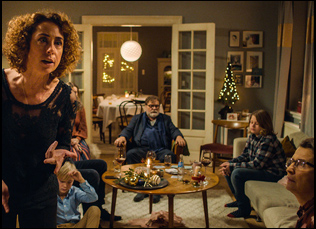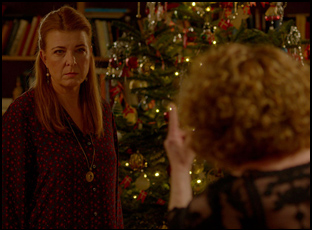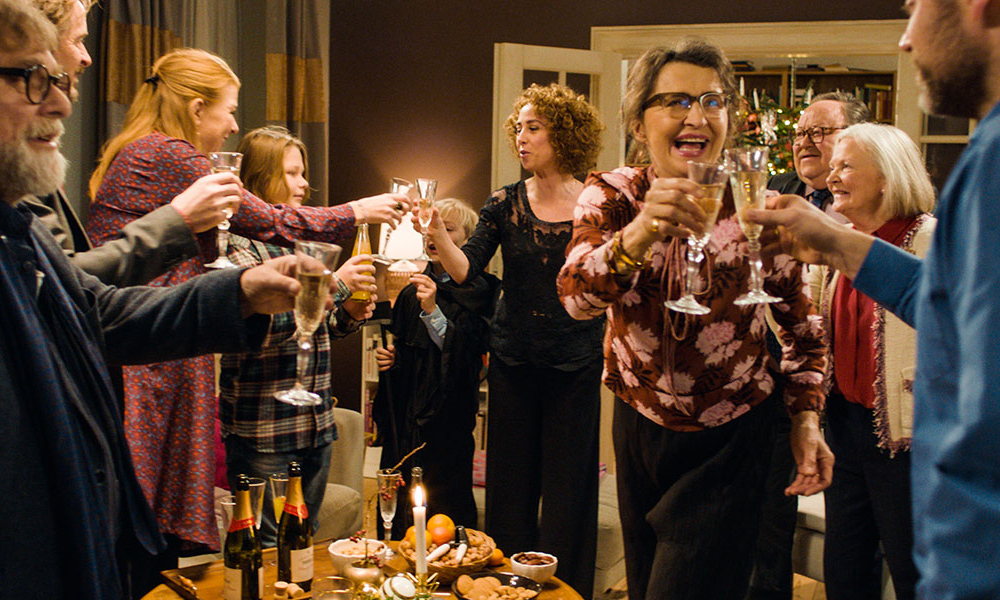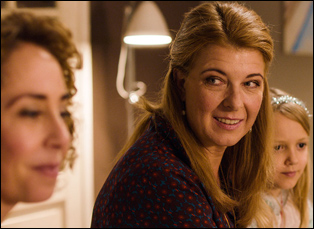To get a sense of the complex family dynamics at play in “That Time of Year,” the deliciously devious new directorial effort from the multitalented Danish filmmaker Paprika Steen, you only need to hear its origin story.
“I was under a rock for a couple of years, and my ex-husband kicked my butt and told me to get up and use my talent,” recalls Steen, a busy star of the stage and screen who last found the time to direct “With Your Permission” a decade ago. “[But then I] said, ‘I want to do a movie about Christmas.’ And he said, ‘Nobody wants to watch a movie about Christmas.’ And I thought everybody wants to watch a movie about Christmas!”
She wasn’t wrong, or at least her own entry into the genre, which is well worth celebrating even if no one on screen ever seems quite in the mood. Steen jumps into “That Time of Year” with both feet as both the director and central member of an estranged family who gathers together for the holidays where annual traditions like putting a prize in the rice pudding for the children to find and telling tales around the tree only expose how much they’ve grown apart from each other, now feeling like obligations rather than signs of how close-knit they are. Nonetheless, Katrine (Steen) is adamant about plunging ahead, opening the home she shares with her husband Mads (Jacob Lohmann) to her sister Barbara (Sofie Gråbøl) and her philosophizing husband Torben (Lars Brygmann) and their troublemaking son Adam (Sofus Sondergaard Mikkelsen), and her divorced parents Gunna (Karen-Lise Mynster) and Poul (Lars Knutzon), who brings along his younger wife much to the chagrin of his ex. She also tempts fate by inviting Patricia (Patricia Schumann), long a black sheep of the family with various dependency issues, who arrives with her husband (Jakob Randrup) and their young daughter Lea (Troja Reppien Trovatten), who no one in the clan is even aware of until they’re sitting at the table.
Having once starred in the mother of all such dramas in Thomas Vinterberg’s “The Celebration,” Steen knows how to work a room for maximum drama, but “That Time of Year” features as much incisive humor as painful revelation, finding the poignance in a running gag involving the disposal of Barbara’s inedible red cabbage as a symbol of all the ways in which the family has hidden secrets from each other over the years, often thinking they’re protecting each other’s feelings yet ultimately allowing the hurt to be recycled time and again. An actor’s actor, one of the few things that doesn’t surprise in the film is that she’s assembled such a strong ensemble for her latest film and gives them all a chance to shine, and shortly after the film’s debut at the Toronto Film Festival, she and Gråbøl spoke about seizing the stress of the holidays with its forced merriment in confined spaces to make a most rewarding film, developing the feel of a real family on set and the benefits of being an actress/director at the center of any given scene.
Paprika Steen: [I thought], “Well, every movie has been done. There’s nothing original inside me.” But I’m interested in psychology and I’m interested in family structure. I’m interested in how we interact with each other because I’m from a family with three marriages on both sides, and [I’ve been to] these huge, massive, crazy, family dinners for many years of my life and [Christmas] stressed me out since I was a kid, so I think the family is a curse and a blessing. You love them and you hate them. You could do a love story, and I thought it was much more interesting to do with 15 people.
Sofie, how did you get interested in this?
Sofie Gråbøl: The main [reason] was Paprika. I’ve known Paprika since we were very young, as a co-actor for many years and she’s a dream from an actor’s point of view of a director because she knows what it’s like to be an actor, and she also has a very sharp eye. One of the reasons why I love this story so much, beside all my personal [connection to Paprika] is that I know this is a film where everyone’s going to relate. I personally felt I’ve never loved my family more than after celebrating this Christmas [in this film] for four weeks, all of December. It had a cathartic impact on me. For the first time I thought, “Okay. Maybe I can live with my family.” [laughs] And it’s a huge strength of the film that it has the boldness to rely on this quite little story. It all takes place one evening, one house, [with the] same group pf people and to trust the drama between the characters is obviously a complete luxury for an actor. And this writer [Jakob Weis], who comes from theater, it’s his first film script and it was actually refreshing that he wasn’t a slave to, “Oh, this is how we write a film.” It’s like he attacks it with this completely new [perspective]. For instance, some of the scenes are over 10 minutes long.
Paprika Steen: All the scenes are 13 minutes. [Initially] I worked with [someone else] first, then she got pregnant. Then I worked on another one, and then he got headhunted to Hollywood. And I needed to find a writer because I can’t write [myself]. Maybe I can, but I don’t have the focus, but I was doing a play by [Jakob], saying his lines every night, and suddenly I said, “I love his dialogue, why don’t I just ask him to write it?” When I said that to my producer, he said, “I was waiting for you to say that.” I really enjoy working with people that are in the right time of their life to do something. The first time I worked with Sophie, she [starred in] a huge TV series, which is really popular, but playing the nice girl next door, and we were talking about, “Now’s the time to [play] another kind of character in your life. As actresses, we can’t play young girls forever. We need to transform into who we are.” We were talking a lot about not smiling at that time…
Sofie Gråbøl: I remember [Paprika] saying that in every scene. “Don’t smile. Don’t smile.” She has such an eye for all the things you lean on that you just do without really considering because you’ve always done it. She strips you of all your routines and forces you to be present.
Paprika Steen: Yeah. Like Karen-Lise, who plays our mother, was also in my first movie [2004’s “Aftermath”], she’s a hippie and a humanist. Everything has to be flowery and everybody has to love each other, but in my first movie, [she] was an ice cold real estate [agent] who was all about how she looks. She couldn’t stand [that role], she was so mad at me. [She said,] “But she has to have an emotion.” [And I said] “No, you’re strict, you’re cool. Walk in heels every day.” I love to put people, like my writer, where they’re not completely secure — when there’s something new for them that they want to develop.

Paprika Steen: These are the most traditional traditions in Denmark, like chapters. We meet about 5, we all go to the kitchen and disturb the chef of the evening. Then of course we go to church first at 4.
Sofie Gråbøl: Christmas Day is the only day the Danes go to church.
Paprika Steen: We come from a very hedonistic country. Even though we’re Christians, we’re not very religious. Some people are, but most people aren’t, so we go to church, and then after that we go home and we talk and talk and talk. We are very loud in Denmark, and we’ve been portrayed as this grey, Nordic noir kind of country, but actually I feel that Danish people are more like Italians and I thought a lot about Italy doing this movie, and the families I’ve been in, because I’ve been with a lot of [cultures] celebrating Christmas. We don’t sit and sing our songs and look in the bible. We have the tradition of eating duck or some kind of pork, but not ham, always the red cabbage, and then we eat this strange, fattening, horrible rice pudding for dessert where nobody can eat anymore and they have to eat this because there’s an almond inside, and you need to get the almond to get the present. Then we go and read this book and go around the Christmas tree to open presents and [that’s] always the most stressful, [besides the] the rice pudding ceremony. It’s always, for me, the worst time of evening. It [depends on] who you are because there are little children there that want presents, but I just dived into my own stress.
You’re working within incredibly tight spaces in this house with a huge ensemble of characters in almost every scene. How do you even squeeze in a camera?
Paprika Steen: I was breaking the [cinematographer’s] back. [laughs] I was pushing him around. It was crazy. I don’t like to rehearse too much — I like to talk about the script, but [there was one scene we] rehearsed a couple times and I was really blocking the scene [saying] “You have the rice pudding, you put it there, then you go over there, then you come in …” and I was very particular about it to make it look effortless. Then we had to [do] handheld camera for that scene, and normally, I wanted [as little] handheld [as possible], but this scene I wanted to be as chaotic and crazy.
Sofie Gråbøl: When you are that many people in almost every scene, there is a lot of coverage even though [Paprika] didn’t do close-ups of everyone in every scene. Still, it became this claustrophobic “Groundhog” Christmas day for all of us. For instance, we sat for eight hours eating rice pudding. We danced around the tree for 10 hours because there was so many characters to cover. So it was mad sometimes.
Paprika Steen: Christmas coma.
Sofie Gråbøl: And every day you would come put on the same costume and back in the same living room.
Paprika Steen: We became a family after. Everybody was sick, everybody had pneumonia. We had a doctor on set and every time we shot [a scene] somebody and the other person would go up to the doctor and get some drugs and then come back. We were coughing and sneezing. It was just crazy, but in a really nice way. I loved every minute of it. That’s how I want to direct. I want to be in the middle of it. That’s why I also like to be a part of it, sitting there.

Paprika Steen: I had a principle to get warmed up. We were doing improvisations before the scenes. We did a prologue and an epilogue of every scene and I didn’t use it necessarily, but just to be there in the spirit and then suddenly I said, “Okay, let’s go,” and we started playing. If I wasn’t in the shot, and I was playing against somebody across the table. I would be playing the scene with Sophie and the suddenly I say, “Line again,” but I was still in my character saying to her, “Say your line all over again.”
Sofie Gråbøl: [Paprika was] flipping in and out effortlessly [from being] a director to I’m an actor. It was no problem for her at all because she always work on 10 levels at a time, but for the rest of us … I mean, sometimes I would be completely thrown because I was playing to [her as] Katrina, my sister, and suddenly my sister says, instead of the lines, “Do it again. Don’t smile.” [laughs]
Paprika Steen: I’m horrible. I’m a dictator.
Sofie Gråbøl: No, no, no.
Paprika Steen: I am, but in a nice way. I listen, more than I see, actually. If the tone of the line is not completely like I want it sometimes, I would go for it until I got it, but I also don’t want to block the creativity of the actor. Sometimes I maybe block them because I’m going for something specific. But I’m sorry [Sofie].
Sofie Gråbøl: No, I totally love direct communication. It’s also a very Danish thing that we don’t have a lot of, “Could you maybe…? [Or] only if you feel like it.” Often I find when we travel, [I’m] often told, “You’re very direct,” or “You’re very confrontational,” and some find us rude because we skip all the politeness, but I prefer that. It makes me feel very secure that I know whatever thought you have as a director, you’re going to tell me, so when you say you’re happy about the scene, I completely trust it because you don’t hold back.
Paprika Steen: No, I never do that. I just think if we’re making people pay to go to the theater or the cinema, and I can’t talk to you, as a director, about the elephant in the room because you’re so sensitive as an actress or actor, I don’t like that. I like to be very honest.
Sofie Gråbøl: That’s also in our culture. In Denmark, we have a very flat structure that goes for our landscape, our political life. It’s good and bad, of course, because every time someone rises, we knock them down, but the good thing is that there’s very little hierarchy.
Paprika Steen: Right. Also, we don’t have time for that. Our budgets are really low. We shot this movie in five weeks, four days a week, ten hours a day. Also, kids are there, so I have to direct them differently and give them space.

Paprika Steen: Yeah, we [adult actors] didn’t have trailers.
Sofie Gråbøl: We stayed together the whole day. Nobody goes to their own little [corner].
What was the premiere like for you?
Paprika Steen: I was very excited, but also a little concerned if it would translate. I finished the movie four weeks ago, so for me, it was a big thing and nobody left. I felt like they were really quiet from the beginning of the movie, even though it’s not a dark movie, and then I was very surprised how much they laughed. All in all, it was a good experience, and we’re going to London before we’re going to open it with a Danish language audience and…
Sofie Gråbøl: They’re going to react to different things, I’m sure, but [the premiere] was beautiful, and confirmation for me that the more local something is — because this is a very Danish story – the more it travels. It’s amazing with film and drama and sharing our stories how you translate it into your own culture. People are the same, whether they dance around trees or whatever their traditions. Their feelings are the same underneath.
“That Time of Year” does not yet have U.S. distribution. It will next play at the London Film Festival on October 14th and 15th.





